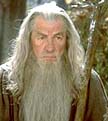 |
 Lord of the Rings: True Mythology?
Lord of the Rings: True Mythology?
The Lord of the Rings trilogy by J.R.R. Tolkien has inspired more commentary, creativity and following than arguably any other modern-day work of art or literature. The successful film adaptation of the first book and highly anticipated release of the second, The Two Towers, has kept the fires of interest alive. Surprisingly, this classic has also been interpreted by--and, thus, embraced by--the adherents of such wildly divergent philosophies as neopaganism and evangelical Christianity. Just what is it about these mystical, mythical and monumental books that spurs whole communities of devotees to create Web sites, Internet browsers, countless graphics, fonts and articles, take on the nomenclature and Tolkien-created languages for their own use and wait in panting anticipation for the celluloid interpretation of their beloved epic?
In this collection of resources, we explore the meanings of the mythology--myth, Tolkien argued, is not by necessity false--as they stem from the author's past, pain and a deep-seated Catholic faith. A master of languages who saw language as intrinsically creative (not simply useful to label reality but to imbue it), Tolkien's created universe and tongues stand alone in the history of literature. Many critics have scorned the trilogy as mere escapism, but Tolkien saw it as discovered reality, that his mythmaking was an attempt to uncover what is real in the clearest way possible: "true myth." (This idea profoundly affected his close comrade C.S. Lewis and his decision of faith in Christ). Biblical imagery, many claim, abounds within the tales--which actually contain no explicit mention of God, Christ or worship.
This seeming ambiguity has left much room for neopagans and others to point out the abundance of gods, spirits, sprites and other mythical and pagan characters in the text. Many in this camp claim as much prominence for their worldview regarding Lord of the Rings as do Christians. We explore the books and author, as well as his worldview with mentions of the movie and related topics in our Special Focus, which we hope you enjoy and share with others.
Feature Articles:
Tolkien's The Lord of the Rings: A Book for Our Time of Terror
Professor Ralph Wood
Dr. Wood, a literary expert on Tolkien, briefly outlines a lecture he gave to Logos Academy in Dallas, Texas. Although very terse, these notes offer deep insight to readers of the trilogy in their present form. Plans call for the audio copy of this lecture to be online at LeadershipU soon.
Looking For God in The Lord of the Rings
Jim Ware
"[The idea] that God uses small hands to accomplish great deeds -- could almost be called the heart and soul of Tolkien's The Lord of the Rings. It's Moses and Pharaoh, David and Goliath, Gideon and the Midianites all over again. But the mission of Frodo and Sam isn't just your typical 'underdog' story. It's something much more."
Tolkien's Lord of the Rings: A Christian Classic Revisited
Professor Ralph Wood
Professor Ralph Wood's passion for The Lord of the Rings shines through this insightful examination of the fantasy epic's meaning and importance. He is amazed that, in a day of passive entertainment, this complex book that spans from time immemorial to the end of the world, remains so popular. Perhaps, he seems to say, readers are grasping at something eternal, transcendent. A sample: "Tolkien's work is imbued with a deep mystical sense of life as a journey or quest that carries one, willy-nilly, beyond the walls of the world. To get out of bed, to answer the phone, to open the door, to fetch the mail--such everyday deeds are freighted with eternal consequence. They immerse us in the river of time: the 'ever-rolling stream'."
J.R.R. Tolkien (1892-1973)
Professor Ralph Wood
Tolkien expert Ralph Wood deeply examines the life of the great author and linguist from his youth, through early manhood and into the "mature years." A picture emerges of a sad, but affable man, brilliantly gifted in language and resolute in his faith.
Related Articles and Reviews:
Tolkien's Lord of the Rings: Truth, Myth or Both?
Berit Kjos
Kjos calls into question the basis of this collection--that mythology can be true and that Tolkien's mythology is, at base, about truth and reality--in part by heavily critiquing this very feature (first edition published online in 2001). She concludes that, by his use of non-specific imagery presumably based on a Christian worldview and his use of pagan myth and occult elements--which Kjos views as out of bounds for Christians in any manifestation, even as literary device--that Tolkien actually obscures God's truth as revealed in Holy Scripture. "Like the serpent's temptation in the garden, Tolkien's illusions of truth appeal to human feelings and may lead to deception," she warns.
Tolkien's Orthodoxy: A Response to Berit Kjos
Professor Ralph Wood
Litererature and Religion Professor and Tolkienite Wood takes to task Berit Kjos, whose criticism of the entire basis of a biblical view of Lord of the Rings appears here. Dr. Wood accuses Kjos of bad literary criticism and worse biblicism, correlating her viewpoint with some of evangelicalism's worst traits.
copyright © 1995- Leadership U. All rights reserved.
This site is part of the Telling the Truth Project.
Updated: